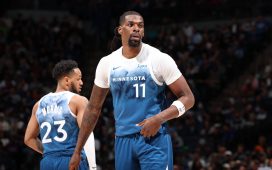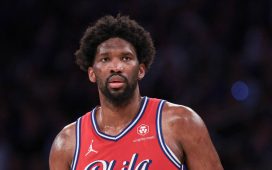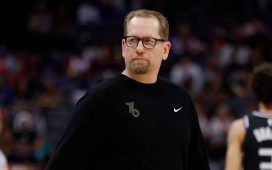SAN FRANCISCO — For Bill Bayno it was never a question of why and how? But rather when and where?
The New York native and Detroit Pistons assistant coach is far too familiar with cancer. He lost his mother to lung cancer, watching it take her precious soul piece by piece. Bayno’s mother was the sixth of nine in her family to die from cancer. Bayno, in the back of his head, always knew it would catch up to him. Combine genetics and his love for candy, cookies and other processed sweets, which he believes factored into his diagnosis, and Bayno had been patiently waiting for his turn in line.
It’s almost morbid the way Bayno talks about his relationship with cancer, but, at the same time, also peaceful.
“I knew I was getting cancer,” he told The Athletic. “I’m not going to be shocked if I get cancer again. I’m going to continue to not eat any more sugar and hope everything works out, but it’s genetic.”
Bayno, after being diagnosed with prostate cancer in the summer, is back doing what he loves. The assistant coach took time off at the start of the season to recover from his surgery. His surgeon, Dr. Craig Rogers, and the team at Henry Ford Health removed the cancer. The surgery allowed him to rejoin the Pistons and get back traveling with the team.
“Thank God I got this while I was with an NBA team,” said the 60-year-old. “When you have good employer health insurance, it makes a huge difference.”
The call Bayno had been anticipating came in late August. A month earlier he waited in line at the annual free-health screening for coaches that David Fogel, the executive director of the NBA Coaches Association, puts on at Summer League. Bayno, who had only recently turned 60, said it had been two or three years since he had taken part in a screening. During his previous one, Bayno learned he had polyps in his colon, but they weren’t cancerous. In between his last screening and this most recent one, Bayno said he felt like he was in tremendous shape, aside from irregularities in his urine stream and waking up often to pee, both of which had been happening for years.

Bill Bayno during his time with the Indiana Pacers. (Brian Munoz / Getty Images)
However, the death of Pistons legend and Hall of Famer Bob Lanier in May stuck with Bayno. The two became friends while doing Basketball Without Borders Africa. The celebration of Lanier’s life that was going to take place while Bayno was in Las Vegas for Summer League made him think twice about dismissing the screening another year. Bayno waited more than two hours in line for testing.
“I wasn’t going to go, but then I was like, ‘You know what?’ I turned 60. I said a prayer for Bob and I went,” Bayno said.
After Summer League ended, Bayno went home to Los Angeles. Shortly after arriving, he received a call alerting him his Prostate-Specific Antigen (PSA) levels were high. From there, Bayno went to Ronald Reagan UCLA Medical Center to get a physical exam. That came back abnormal. In early August, Bayno was finally able to get a biopsy appointment. A few weeks later, the biopsy confirmed it was cancer.
“I’m lucky because if I didn’t do that screening at Summer League, I would have been walking around with it all season, growing inside of me probably,” Bayno said. “It could have spread. That’s the only issue … if it spreads. Prostate cancer, for the most part, doesn’t kill you unless it spreads to other areas.”
The free health screening at Summer League started in 2018.
“Coach Bayno is a testament to the importance for all coaches to have annual health and heart screenings,” Fogel said in a statement to The Athletic. “The NBCA screening at Summer League provides an important health resource for our members. By bringing expert doctors and equipment directly on-site for the coaches, it provides a unique and efficient opportunity to take part in the 30-40 minute health screening process that could help save a coach’s life.”
Despite his anticipated cancer diagnosis becoming a reality, Bayno was still in shock. He was by himself when he found out. He called his family first, then Pistons’ general manager Troy Weaver and head coach Dwane Casey, who he also worked with in Toronto, to alert them. Both were worried and, obviously, gave Bayno the time he needed to get surgery and recover.
The next call Bayno made was to Cade Cunningham, the Pistons’ star player and the No. 1 pick in 2021. Cunningham was Bayno’s project. It was Bayno who worked Cunningham out individually before games, after practice, etc. They had been working together all offseason, from May through July. They were supposed to get back together in August once Cunningham returned from vacation, but given what was ahead for Bayno, he had to pass his duties off to developmental coach Keith Bogans.
“Keith really helped Cade up to the injury,” Bayno said. “Didn’t miss a beat.”
Luckily for Bayno, his cancer at the time of the surgery wasn’t aggressive. The Gleason grading system, a score to determine how intense cancer is, showed that all of Bayno’s scores were on the low end. Given his history, Bayno still couldn’t escape the natural fear associated with the word “cancer.”
“I would always catch myself thinking, ‘Dang, is it going to spread? How bad is the surgery?’” he said. “You do worry, but knowing what my friends went through, watching my mom, the cancer just taking a little piece of her day by day. I was OK.”
Bayno believes his vegan diet is part of the reason the cancer wasn’t aggressive at the time of the surgery in October. A study published in 2021 showed that a vegan diet can not only reduce the risk of prostate cancer by 35 percent, but it can also lessen the need for aggressive treatment.
Bayno had been a vegan for 2.5 years, but even he admits that doesn’t mean he was the cleanest of eaters. His sweet tooth was always itching. Although there is no definitive link to excess sugar consumption and its part in prostate cancer, Bayno used this opportunity to improve his eating habits.
“I ate tons of processed sugar,” Bayno said. “I’ll be a vegan three years in March, but I ate a ton of sugar because, technically, sugar is vegan because it’s from the Earth. The processed candy and cookies are just terrible for you. I cut that out of my diet and it’s been a positive. I’m feeling even more energetic than I was.”
Around the time the NBA season began, Bayno was at home in Detroit recovering. The former workout junky couldn’t work out intensely for six weeks.
Once that time was up, Bayno would go for long walks. When the Pistons were on the road to start the season, he would walk the 3.5 miles from his Corktown neighborhood home to Detroit’s practice facility in New Center. Once he arrived, Bayno said he would do some treadmill work, light weightlifting, get in the sauna and then walk back.
Bayno had stopped working out as much as he used to because being a vegan wasn’t allowing him to gain weight. There was a time before he arrived in Detroit last season when he couldn’t go a day without working out. The cancer and recovery got him back on his old regimen.
“I used to have to have a workout, especially for my mental health,” Bayno said. “This got me back on it.
“Early on, I would do a lot of walking post-surgery, and they wanted me to. They didn’t care how tired I got. They said I’d get tired. I was really tired for about four to six weeks.”
Last Wednesday, Bayno was sitting on the opposing bench inside the Warriors’ Chase Center, equipped with the energy, wit and humor he has always carried. One coach from Golden State’s side walked past Bayno, who called his name. He jumped with elation, making noises that only an excited teenage girl could emulate. Our interview got momentarily delayed as the two gentlemen briefly caught up.
Bayno was back in his happy place.
Earlier this season, Bayno cut a promo for Henry Ford Health Systems, talking about his cancer scare and encouraging others to utilize the provider’s free test. Hundreds went and got checked out after seeing Bayno’s video during a Pistons game.
“That probably saved some local lives in Detroit,” he said. “A negative turned into a positive, which is always what you want to try and do in life.”
Bayno is very much at peace with whatever the future holds. He has found solace in what, in his mind, almost feels like the inevitable. And that has allowed him to cherish the present like never before.
“I’m just appreciative of having my health, a great life and focusing on the positives,” Bayno said. “You could get that call again.”
(Top photo of Bill Bayno courtesy Detroit Pistons)








